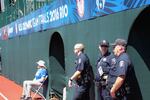
Eugene Police officers at the Olympic Trials. The goal of law enforcement on-hand is to “recede into the background,” according to Kelly McIver with UOPD.
Bradley W. Parks / OPB
Vashti Cunningham, the 18-year-old high jump phenom, left Hayward Field around sunset the first Sunday of Olympic Trials in Eugene.
Earlier in the day, Cunningham secured a spot on Team USA for her first ever Olympic Games. She walked toward the exit alongside her father and coach, Randall Cunningham, himself a former NFL quarterback, as the setting sun bathed the stadium in gold.
No security entourage piled up around the Cunninghams to offer a buffer from eager fans or media. The pair just walked — stopping on occasion for autograph-seekers — through the gate and onto the University of Oregon campus.
The openness is partly by design. The goal of law enforcement on hand is to “recede into the background,” according to Kelly McIver, public information officer for the University of Oregon Police Department.
“You’re trying to be cautious and watchful of things, but you still want to create an open, enjoyable event,” he said.
Thus, a walk through the Hayward Field grounds or the TrackTown festival area on Agate Street yields only passing glimpses of law enforcement officers. McIver said most fans’ only noticeable experience with security may be slightly longer lines to get into the stadium.

Eugene Police officers walk down Agate Street outside Hayward Field. Spectators are almost as likely to see athletes walking the grounds as they are law enforcement.
Bradley W. Parks / OPB
More than 20,000 people have attended Olympic Trials each day since the start.
McIver said large-scale attacks on crowded places have become common enough in the past several years to develop systems to manage such emergencies. So recent tragedies like those in Orlando, Istanbul, Paris and now Dallas do not drastically alter the approach to security.
“They don’t play a big role because those types of tragedies are something we’ve known for a long time,” McIver said.
But that does not downplay the scale of the security operation at the event.
“It is a huge operation, obviously, because your number one goal is to [work] so the crowd has an enjoyable experience,” McIver said.
McIver said the biggest challenge with longer events like the trials is staffing and keeping officers fresh.
Securing an event like the Olympic Trials is quite different than something like an Oregon Ducks football game at Autzen Stadium. There's a regularity about the football season: games are weekly and the season comes every year. The repetitive nature of a football season allows for a more routine approach to security.
Neither UOPD nor TrackTownUSA, the nonprofit group coordinating the trials, chose to disclose how many officers or even what agencies contributed to security in Eugene. McIver said a joint command comprised of UOPD and the Eugene Police Department in addition to other local, state and federal agencies lead the security operation.
The cost of the security operation is unknown, but the Oregon Legislature rejected a request for $3 million to cover security costs at the trials and the IAAF World Indoor Championships in Portland — both organized by TrackTown.
The Register-Guard reported in late June TrackTown had approximately a $10 million operating budget for the Olympic Trials but was facing a shortfall. TrackTown CEO Michael Reilly told the newspaper the gap was "definitely not a cause for concern."
